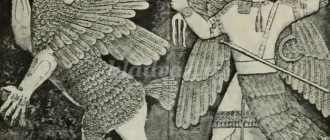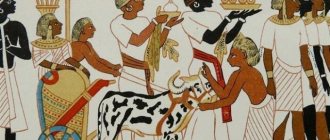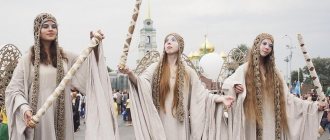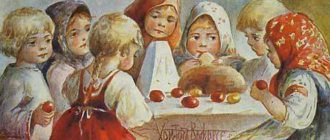What holiday is it today?
December 09, 2021, Thursday
Today are holidays, events: Day of Heroes of the Fatherland International Anti-Corruption Day Tomorrow: World Football Day Human Rights Day Day of the creation of the communications service of the Ministry of Internal Affairs Memorable date in the military history of Russia: Capture of the Plevna fortress in 1877
Today is the Orthodox holiday of St. Alypius the Stylite. Consecration of the Church of the Great Martyr George in Kyiv. Saint Innocent, Bishop of Irkutsk... Tomorrow: Great Martyr Jacob of Persia. Venerable Palladius of Alexandria. Celebration in honor of the icon of the Mother of God, called “The Sign”. Saint James, Bishop of Rostov. Blessed Prince of Novgorod Vsevolod, in holy baptism Gabriel, Pskov wonderworker. Venerable Theodosius of Ternovsky...
Today is a national holiday: St. George’s Day... Tomorrow: Feast of the Sign...
Seasons
Seasons, four periods of the year (spring, summer, autumn and winter) characterized by certain average temperatures. The period during which the Sun passes through one of these sectors is called the season. Spring in the Northern Hemisphere and autumn in the Southern Hemisphere begin when the Sun passes through the initial circle of declination and its right ascension is 0° (vernal equinox). Summer in the Northern Hemisphere and winter in the Southern Hemisphere occur when the sun's right ascension is 90° (summer solstice). Autumn in the Northern Hemisphere and spring in the Southern Hemisphere begin when the sun's right ascension is 180° (autumnal equinox). The beginning of winter in the Northern Hemisphere and summer in the Southern Hemisphere is considered to be the winter solstice, when the direct ascension of the Sun is 270°... Next: Seasons. Russian folk calendar. Monthly words...
Holi - Hindu spring festival
The popular annual Hindu spring festival, otherwise known as the Festival of Colors, takes place in late February and early March. This is one of the oldest holidays, dating back more than 2000 years. For the celebration, colored powders are specially made from medicinal herbs (neem, kumkum, haldi, bilva, etc.), which are generously sprinkled on festival participants, turning themselves and everything around into a kaleidoscope of bright colors.
Natalya Elizarova
Folk calendar about every day
Every day one season always replaces another and this determines a person’s way of life. In connection with this, a folk calendar was formed in which there were practically no nameless, unmarked days. Every day was special, had its own purpose. All this was determined by climate conditions and astrological phenomena.
A calendar is a system for counting periods of time. The first calendars arose a long time ago, in ancient times, because there was a need to measure time. The word calendar comes from the Latin words caleo - to proclaim and calendarium - debt book. This is due to the fact that in Ancient Rome the beginning of each month was especially proclaimed, and because it was customary to pay debts on the first day of the month. Different peoples counted time differently. Some calendars are based on the changing phases of the moon - lunar calendars; in others - the change of seasons - sunny; in others, the length of the year was coordinated with the change of seasons, and the counting of months was associated with the phases of the Moon. Such calendars are called lunisolar.
In Rus', the calendar was called a monthly calendar. Every day, the month book covered the entire year of peasant life, “describing” day by day, month after month, where each day had its own holidays or weekdays, customs and superstitions, traditions and rituals, natural signs and phenomena. The cyclical nature of the calendar is reminiscent of human life, where spring is youth, summer is heyday, autumn is the time of harvesting fruits (it’s good if there are some, otherwise you can live your life without collecting fruits), winter is the time of wisdom and peace. This cyclicality and rhythm determined the way of life of the farmer. The folk calendar was an agricultural calendar, which was reflected in the names of the months, folk signs, rituals and customs. Even the determination of the timing and duration of the seasons is associated with real climatic conditions. Hence the discrepancy between the names of the months in different areas... Next: Folk calendar...
Tomatina
The reddest, juiciest and most delicious festival in Europe. Every year on the last Wednesday of August in the Spanish city of Buñol, the world famous Tomatina or tomato battle takes place. Every year, more than 100 tons of tomatoes turn into tomato slush, which simply fills the city. Before throwing a ripe tomato at one of the participants, it should be crushed. Now can you imagine what happens in the city during the tomato fights? This holiday has long been called “The Dirtiest Fiesta.”
And the most amazing thing is that this crazy entertainment has no serious background. They say that about 50 years ago, someone started throwing tomatoes while playing, and the rest liked the game. This is how tomato fights appeared.
Fishing calendar for every day
The fishing calendar should not be taken as an absolutely indisputable truth. Fish biting is greatly influenced by a whole range of natural factors, as well as the influence on the nature of man himself. You must not forget that the fish’s bite depends and is determined not only by the calendar dates and biological cycles of their life, reflected in the calendar, but also, no less, by the state of their habitat; the bite also depends on weather conditions: air and water temperatures, cloudiness, wind direction and strength, etc... Next: Fishing calendar...
Art festival Burning Man
A bright, spontaneous, crazy festival takes place in the last week of August in the Nevada desert. For 8 days, something unimaginable happens among the desert sands. Incredible sculptural objects, naked people, dancing, music and, as the apotheosis of all this action, the burning of a wooden figure of a man.
Orthodox calendar about every day
Orthodox calendar: Orthodox, Church and Christian holidays.
The church year is an alternation of weekdays and holidays. On weekdays, a person is called to work “by the sweat of his brow to earn his bread.” Holidays are given in order to feel liberation, to rise above the bustle and routine of the world, to feel involved in the highest of worlds, “where there are no illnesses, sorrows and sighs, but endless life.” Since ancient times, holiday cycles have been associated with the seasons. The pagans associated them with the worship of the forces of nature, the cult of which in the Old Testament was replaced by gratitude to the Creator for the universe. And although the connection between holidays and the seasons has not completely lost its power, since God is present in everything, in the plant and animal world, in human works, it nevertheless faded into the background, giving way to a spiritual foundation built on the Sacred Scriptures. The history of Orthodox holidays dates back to the times of the Old Testament. Each of the Orthodox holidays is dedicated to the remembrance of the most important events in the life of Jesus Christ and the Mother of God, as well as the memory of saints... Next: Orthodox calendar...
Russian folk calendar for every day
The word “sign” comes from the word “notice”, i.e. observe. As a result of observing what happens around a person every day, he accumulates life experience. This knowledge was passed down from generation to generation, carefully preserved and people trusted it as a sacred book. Many signs have come to us from the depths of centuries without losing their knowledge. Each of us is free to choose: to dismiss all this as an absurd superstition or to take a closer look at the signs and take the centuries-old experience of generations more seriously. Most of us, when taking exams, ask them to scold them, boasting about some kind of good fortune or luck, spit so as not to jinx them or knock on wood, take a detour if a black cat crossed the road, are afraid of the number 13 and much more. And who among us does not have lucky things, numbers? Who has never resorted to the help of fate at least once in their life, who has not believed in secrets? It’s as if everything connected with signs is hidden somewhere deep in our subconscious. Often we remember them mechanically, unconsciously, or just as a joke. But, undoubtedly, the signs contain a lot of accurate knowledge and practical wisdom of our ancestors. They cover all the characteristic, often difficult to perceive, natural phenomena. Signs have preserved a lot of what was in old folk holidays and customs; they help predict the weather, grow crops... Next: Folk signs...
Ice and Snow Festival in Harbin
Harbin is one of the centers of ice and snow culture in the world, and the Ice and Snow Festival has been held here since 1963.
A whole ice city is being built here: with tall houses, bridges, gardens. Despite the fact that ice and snow have nothing to do with color, I still cannot exclude this festival from the list of colorful holidays. As soon as night falls, the icy city flashes with all the colors of the rainbow.
Holiday calendar, dates and events of the year
All state and professional holidays in Russia, including significant World and International holidays, and other equally interesting holidays and events about every day.
The holiday has always kept pace with the history of mankind. Social time can be divided into three types: everyday life (weekdays), weekends and holidays. Everyday life is a series of practices repeated day after day and every day (work). Weekends are regular breaks from the rush of everyday life. It is believed that on weekends a person should restore his strength after working days. Day off, non-working day. A holiday is a day of celebration established in honor or in memory of someone or something. A day or series of days celebrated by the church in memory of a religious event or saint... Next: Calendar...
Prayer book, Orthodox prayers for every day
Prayer is the most powerful means for healing all illnesses - both physical and mental. Prayers can be laudatory or grateful, petitionary and repentant. If we have offended God, sinned, we must ask Him for forgiveness, that is, repent. Such prayers are called repentant prayers. If everything is fine with us, if we and our loved ones are healthy and prosperous, if we have a place to live, something to wear, something to eat, we must glorify and thank God for this. Such prayers are called praise or thanksgiving. If some misfortune, illness, trouble or need happens, you need to ask God for help. Such prayers are called petitionary... Next: Orthodox prayers...
Zodiac, astrological, eastern calendar. Zodiac signs
In ancient times, to establish the calendar, priests used knowledge of the positions of all the planets. Before the reform of Peter 1, the New Year was celebrated on the Day of the Autumn Equinox. On this day, according to ancient legend, the most peaceful treaty was concluded between the Great Race (ancient Slavs) and the Great Dragon (ancient Chinese) and it was approximately 7518 years ago... For the ancient Slavs, the calendar month corresponded to the lunar cycle from new moon to new moon, taking into account such Thus, the relationship of the entire annual cycle with astronomical and natural phenomena. There was no coherent calendar system. The main natural phenomena are still considered to this day to be the days of the solar equinox and solstice - the Slavic holidays Maslenitsa, Kupala, Ovsen and Kolyada. But during the time of Peter 1, all ancient Slavic calendars were abolished and a new Western European calendar from the Nativity of Christ (Julian calendar) was introduced, while the beginning of the calendar was moved to January 1. The Julian calendar (old style) did not take leap days into account and accumulated one extra day every 128 years. After the October Revolution in 1918, the Gregorian calendar (new style) was introduced in Russia, according to which an amendment of 13 days was introduced. The calendar of the ancient Slavs was based on two planets: the Sun and the Moon. And now they don’t use anything at all. The calendar has become static. There is no such thing as the calendar, it turns out, resting on some planet. Nobody even knows about it. There are just some standard numbers, there are months and holidays. The calendar is based on the Sun and Moon. Why is this so? Because these two luminaries influence the Earth. The Earth revolves around the Sun, and the Moon revolves around the Earth. And these two luminaries create the atmosphere on the planet. From here the calendar is built... Next: Astrological calendar...
Vacation
How many official holiday days are there in a year?
Do official vacation pay coincide with actual ones?
Russia. There are 2–4 weeks of vacation per year, and under certain circumstances you can take more.
Denmark. Official vacation for a month or more. It's easy to get it in full - no one will grumble if you take all 4 weeks in a row.
Latvia. Vacation lasts 2–4 weeks, it is easy to get it in full, and the employee is usually not disturbed during it.
Singapore. A vacation of at least a month; under certain circumstances, you can take more vacation days. The employee there is usually not disturbed.
Finland. Vacation is 2-4 weeks, and it is customary to take it in July - the only time when you can catch very warm and sunny weather here. Because of this, the country almost dies out for a month - everyone goes somewhere outside the city, to their dachas, to nature.
Sweden. Vacation 2–4 weeks. It is easy to get it in full, plus there is a bonus - one vacation day is paid as a working day with some percentage on top. This is called semesterlön and is fixed at the state level.
Australia. Vacation 2–4 weeks per year. Under certain circumstances, you can take more.
Cyprus. Still the same 2–4 weeks, it’s easy to get everything in full.
Luxembourg. Still the same 2–4 weeks, it’s easy to get everything in full.
China. An employee with a minimum length of service is entitled to 5 days of vacation per year. Over time it can grow to 10–15 days.
Dream books online, interpretation of dreams
A dream book is nothing more than an interpreter of dreams and dreams, a translator of dreams. Since ancient times, people have been using dream books; dreams have always been given great importance, and people have often noticed the prophetic properties of some dreams. The dream book can become your faithful assistant every day and throughout your life, thanks to the dream interpreter you can always make the right decisions, the dream book will help you resist temptations in time, and will warn you against wrong steps and frivolous actions. Further…
Carnival in Rio de Janeiro
The most famous and popular holiday, of course, is the carnival in Rio de Janeiro. The Brazilian Carnival is a night of love and passion. It's an ode to sex and lust. Here the brightest fire of human feelings is kindled. Perhaps this is the most emotionally charged festival in the world. For Brazil, a carnival procession to the sounds of samba and lambada is already an integral part of the country’s cultural traditions. In the midst of the Brazilian summer, namely in February, for exactly 4 days and 4 nights, the sexiest performance in the world takes place in Rio de Janeiro.
In fact, this carnival is just a parade of samba schools. Fourteen dance schools in Brazil take to the streets and put on a great show. Each school was given 82 minutes to perform. And the number of participants in schools ranges from two to six thousand people. There are certain rules that festival participants must follow. For example, dancers are prohibited from exposing their genitals, so we often see thin threads in front and behind. In this simple way, participants ignore the laws.










